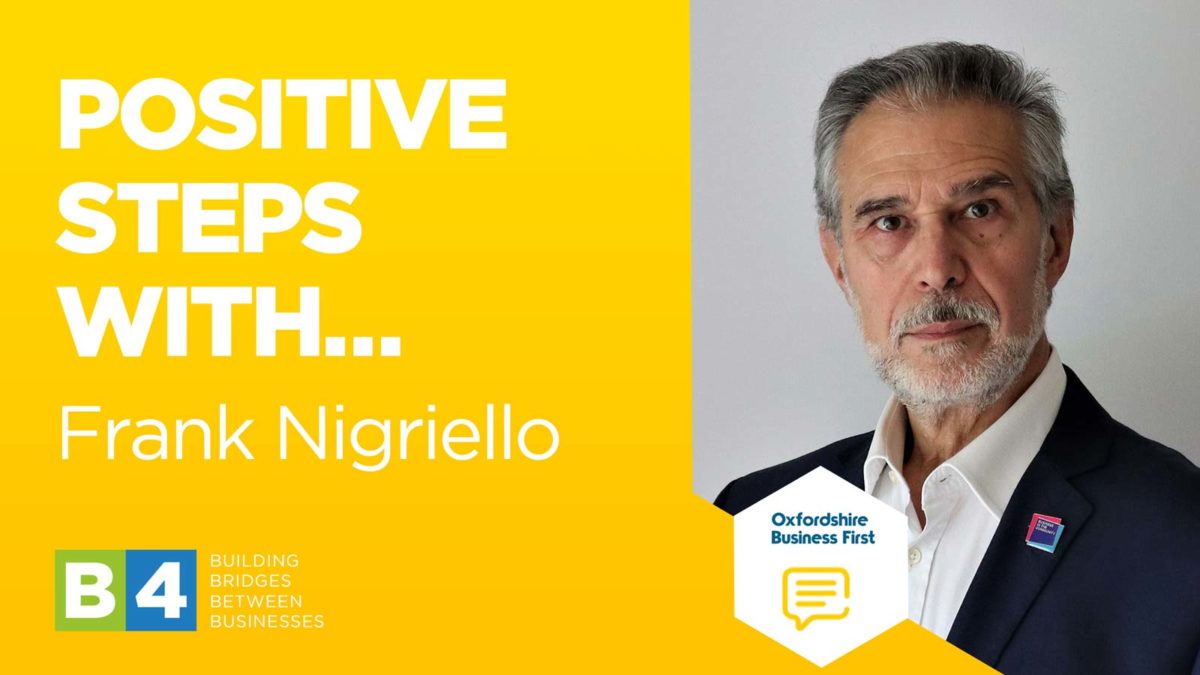
Positive Steps with Frank Nigriello, Chairman of Oxfordshire Business First
I’ve attended a number of webinars with large numbers of people who are talking about a new imperative for the 21st century.
The pandemic is the most prominent driver for change, but it’s not the only catalyst. The health of the planet, inequality, questionable leadership, and the impact of pervasive technologies add up to an agenda for social, economic and political change that stretches far beyond national boundaries.
But what about us? What can businesspeople do to prepare and help to shape this brave new world?
I’ve outlined five areas that should form part of the strategic plan for every business, large or small.
1. First, focus on rapid revenue growth with existing customers by spending the time to ensure your product or service offering matches your customer’s need.
In some cases, customers’ needs may have changed – you may find that as more employees work from home, businesses are looking for a wider range of services to keep their people connected and engaged, and new ways to connect with their customers.
While adapting your own business, it’s vital to reconsider the viability of supply chains, particularly those which involve offshore sourcing. If you’re depending on anything from China, you’ve probably already felt the pressure on supply.
2. The second large scale change is around people – particularly the health and safety of our employees and our customers.
For most companies, the top priority has been keeping employees safe; that’s been down to social distancing and working from home.
Working from home has been the answer for many of us. Most employees who can work from home will be doing so for far longer than they may have expected. But that’s not without its problems.
Make certain that anyone who can work from home is fully equipped and trained to do so. Establish and communicate a clear policy so that everyone understands the rules. That may include provision for some social time on Zoom just to keep people in touch – or time during the day to step away from the desk for some exercise or even supervise the kids.
Finally, build stronger, more frequent, and more conversational communication channels to keep employees informed, and equally important, to get their feedback, ideas and issues through active listening.
3. Coronavirus has raised the temperature on the drive to implement automation. Intelligent software like chatbots and robotic process automation increasingly are being applied to customer contact and labour-intensive knowledge work – which was previously down to call centres. Rather than wholly replacing humans, these technologies are being used to automate around 30 percent of people’s tasks.
Regardless of the size or scope of your business, the third step is planning to introduce automation into your business model in the short term.
4. Fourth, Covid-19 has provided us with one upside: the biggest carbon crash on record and the potential to do something phenomenal about the environment.
Energy efficiency, reduction in travel, recycling, and reducing waste are just some of the drivers for that can make post Covid business planning more than just recovery – it can result in businesses being better at everything we do. This is a great time for every business to develop a plan for contributing to a circular economy and eliminating waste from everything we do.
5. Finally, for some of us, there’s been a pause in our business. For others, the workload has doubled. For those in the charity sector, the pandemic has meant a double whammy: the loss of funding and the increase in need.
It’s now a great time for businesspeople to plan how they can give back by reaching out to those charities that are meeting the needs of so many parts of our communities.
Organisations like Business in the Community’s National Business Response Network (https://www.bitc.org.uk/national-business-response-network/) are linking businesses with organisations that desperately need support. That’s not just funding, in many cases, charities are asking for legal, marketing and management skills that can make all the difference to their ability to help those who need it most.
If Covid-19 taught us anything, it’s that prevention is better than cure. Businesses now have the opportunity to rethink business models, rebuild value propositions, sharply reduce their impact on the environment and pay something back in terms of time, skills and donations. It’s a great time to set a new agenda for systemic change in our businesses, our communities and in our lives.
More in Business as a Force for Good

Join us to help disadvantaged people in Oxfordshire this winter
Oxfordshire Community Foundation (OCF) have launched an appeal to raise £60,000 towards its Living Essentials Fund. The Living Essentials Fund will help the most disadvantaged people in our county who are struggling to afford the basics – housing, food and warmth. Grants will be made to grassroots charitable organisations across Oxfordshire working to support them […]

B4 Member of the Month – Phil Lawrie, Silverstone Museum
Last month we launched a new Member of the Month Award where a Member is recognised for epitomising the true spirit of B4. Helen Fallon was a very deserving winner of a lovely bottle of Hundred Hills bubbly for being an all-round key part of the B4 community.

B4 BETTER BUSINESS ECOSYSTEM: Target’s ‘Pillars of Purpose’
Sam Kandiyali of Target PR shares Target’s Pillars of Purpose – a conceptual model that explores the relationship between PR and purpose (why an organisation exists).
From this author

Unipart named CCS supplier
Unipart has been named as a supplier on Crown Commercial Service’s (CCS) Logistics, Warehousing and Supply Chain Solutions (RM6329) framework agreement.

Unipart partners GBUK
Unipart has formed a strategic partnership with GBUK

Unipart launches in Vietnam
Unipart, the supply chain performance improvement partner, has launched operations in Vietnam.

